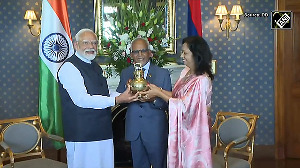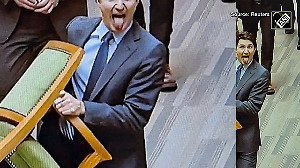A nonproliferation hawk, who vehemently opposed the US-India civilian nuclear deal, former Congresswoman Ellen Tauscher is now set to lead the State Department charge to push President Obama's nonproliferation agenda to seek a worldwide ratification of the Comprehensive Test Ban Treaty and a strengthening of the Nuclear Nonproliferation Treaty that is bound to put pressure on India.
Tauscher, a California Democrat, will take over as Under Secretary of State for Arms Control and International Security, testifying at her confirmation hearing before the Senate Foreign Relations Committee, said in her written statement, "We expect to complete negotiations with India and reach agreement on reprocessing related arrangements and procedures within the 12-onth time period allowed for negotiations as set forth in Article 6 of the 123 Agreement."
Tauscher informed the lawmakers on the Committee, which is chaired by Senator John F Kerry,that on February 3, the Government of India had requested consultations to begin arrangements and procedures under which the reprocessing and other provisions of the 123 Agreement, "or any other alteration in form or contention could take place." "We have acknowledged the Indian request and have affirmed our intention to begin consultations within the six month period referred in Article 6(iii), that is by August, 2, 2009," she said.
Saying that the Obama Administration was now in the process of "determining what provisions should be contained in such an agreement," Tauscher explained that "once we have an inter-agency agreement on a proposed text, and have consulted with the International Atomic Energy Agency on its needs, we will forward a draft text to the Indian side for comment and will offer to open consultations on a specific date."
The position that Tauscher will be filling, was previously offered to Robert Einhorn, the quintessential 'nonproliferation ayatollah,' who was Assistant Secretary of State for Nonproliferation in the Clinton Administration and also part of the first term of the George W Bush Administration, before he was pushed out largely due to being intransigent toward any nuclear deal or transfer of dual use technology to India, but he had turned it down opting to remain in the think tank circuit. But two weeks ago, Secretary of State Hillary Clinton, appointed Einhorn as a special adviser to her on nonproliferation mattersa position which doesn't need Senate confirmation.
At the time Tauscher's appointment by President Obama became known, diplomatic sources said that she was of greater concern to India because "at least with Einhorn, we had dealt with him for years and knew where he was coming from," but with the US lawmaker her angry rhetoric and steadfast refusal to be moved by India and those in support of the US-India deal right to the bitter end, "shows a streak" they predicted could "be troubling," and could "possibly complicate," even the expeditious implementation of the agreement that could lead to the transfer of nuclear reactors and fuel to India to pursue its energy requirements.
Tauscher during the final debate and vote on the 123 Amendment last year, voted against it even though Congressman Howard Berman, also a California Democrat, and chairman of the House Foreign Affairs Committee with whom she had co-sponsored a 'killer amendment,' preceding the vote on the Hyde Amendment to make a cut off of fissile material a pre-condition for the consummation of the accord, had ultimately voted for the deal.
In fact, even after the Nuclear Suppliers Group endorsed the 123 Agreement and decided to grant India the exemption that envisaged New Delhi to engage in civilian nuclear trade after more than 30 years of isolation, Tauscher remained unrepentant, and described the NSG's green light as "a dark day for global efforts to halt the spread of weapons of mass destruction," and warned that what she described "as this shortsighted step," would not even benefit American companies as India, now that it had received this exemption would purchase its reactors and fuel from Russian and the French companies.
She predicted that "this will ironically do very little for the American nuclear industry, as India will likely buy nuclear technology from Russia and other suppliers." Tauscher also consistent spoke of the deal leading to a nuclear arms race in South Asia and undermined Washington's efforts to stem proliferation by North Korea and Iran, the argument that the other vitriolic opponent of the deal, Congressman Ed Markey, Massachusetts Democrat, consistently kept throwing up.
During her confirmation hearing Tuesday, Tauscher--who was given a rousing show of support by House Majority Leader Steny Hoyer, Maryland Democratsaid, "In my view, working toward ratification of the Comprehensive Test Ban Treaty is one way that we can persuade other states to permanently end nuclear testing and curb the proliferation of nuclear weapons."
She said, "If I am confirmed, I will work closely with you, Mr Chairman, Senator (Richard) Lugar, and the members of this Committee, to make sure you have the most up to date technical, military, and diplomatic analyses on issues relating to the CTBT. To this end, I share the Administration's commitment to obtaining the Senate's advice and consent to ratify the CTBT and to launch a diplomatic effort to bring states that have not yet signed the treaty on board so that it can be brought into force."
Tauscher also said, "As part of my responsibilities if I am confirmed, I would help the Administration negotiate a global, verifiable Fissile Material Cutoff Treaty. In my view, such a treaty is a critical step toward containing the growth of military nuclear programs around the world."
She also referred to the "A Q Khan nuclear black market network," arguing that "it proves how important it is to work harder to strengthen US and multilateral export controls and to implement United Nations Security Council Resolution 1540 more effectively. I want to work with you to expand and institutionalize these nonproliferation tools, including our efforts to interdict shipments of weapons of mass destruction through the Proliferation Security Initiative."
Former Assistant Secretary of State for South Asian Affairs, Karl Inderfurth, who also served in the Clinton Administration along with the likes of Einhorn, has however dismissed concerns that these nonproliferation hawks like Tauscher and Einhorn could throw a spanner in the works regarding nonproliferation policy towards India and try to complicate the nuclear deal.
Inderfurth, now a professor of international relations at George Washington University, told rediff.com "President Obama has made clear of his support for the nuclear deal because in his view this would strengthen our relations and build our strategic partnership." Thus, he argued, "All those coming into the Administration will be following the lead of the President in their respective areas, including on this issue."
Inderfurth, who was a South Asia policy adviser to the Obama campaign, also pointed out that Obama had also made clear that on the issue of nuclear proliferation, "ensuring that nuclear technologies and other weapons of mass destruction don't get into the wrong hands that it's a joint endeavor that we need to pursue with others in the international community, including India."
"The fact is that he has gone beyond that to talk about a nuclear-free world, which is highly consistent with what the Indian government has said from the time of Rajiv Gandhi's proposal of universal disarmament to Manmohan Singh at the United Nations last year when he talked about nuclear disarmament that is done by all nuclear powersnon-discriminatory and working to see the elimination of all nuclear weapons."
Inderfurth said, as a result, "I see the broader nuclear agenda that can now be pursued between the United States and India and with the fundamental foundation in my view of the civilian nuclear agreement and be full partners on civilian nuclear issues, and work to be full and equal partners on nuclear nonproliferation issues."
He reiterated that just because "some of the more prominent nonproliferationists are coming into the Administration, that should not be seen in my view as a threat of challenge to India," and added, "With the US-India civilian nuclear agreement, a done deal, there is a foundation now to expand our cooperation on nuclear matters and I think we would be active partners in that. So, I am encouraged by these steps."







 © 2025
© 2025